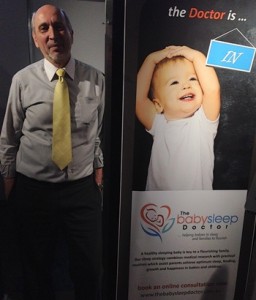We were delighted to see so many families when we exhibited at the Pregnancy, Babies and Children’s Expo last week in Brisbane.
Regrettably, my talk on Sunday was disrupted and some negative posts were made on social media largely due to the advice I give on breastfeeding and starting solids. This was disappointing for two reasons i) those who made the effort to come to my talk may not have, because of the disruption, received the optimal benefit of it and ii) the criticisms levelled at my advice are founded on misinformation.
So the purpose of this blog is to a) set out the key points from my talk and b) to state (again) what advice I give parents on breastfeeding and other matters.
Achieving a full night’s sleep
The key points from my talk were:
- If your baby is unsettled or crying common causes in my experience are going to be:
- Hunger
- Over-tiredness
- Babies need 16-20 hrs of sleep per 24 hours in their early weeks
- They can often become overtired if their waking period is prolonged by even 10-15 minutes. Parent-independent or what I call “parent lite” cues of sleep are the most useful.
- Both hunger and tiredness
- For a full night’s sleep by about 12 weeks:
- Avoid hunger
- Top-up bottles using either EBM or formula will support breast feeding on those days when a mother feels that her supply is low
- Prevent over-tiredness
- Waking periods are about 20-40 minutes
- Try to achieve 16-18-20 hrs of sleep per day
- Sleeps should initially be about 2-5 hrs long
- Aspire to a 12-hour sleep by 12 weeks (although there may still be a feed in that time for some children)
- Avoid hunger
- Use parent-independent or “parent lite” cues of sleep as often as possible.
The advice I give parents
Breastfeeding:
- I support, encourage and promote breastfeeding when it is possible. Every breastfeed has benefits for mother and child. It is a fundamental part of my care to support and maintain breastfeeding for as long as the mother wishes.
- But I am very hesitant to insist on exclusive breastfeeding.
- This is because, sometimes exclusive breastfeeding is not adequate to achieve optimal growth for a child, and in this case, I recommend introducing top-up bottles to complement breastfeeds.
- In some cases, breastfeeding is not possible at all and so I support parent’s feeding choices so long as they are healthy and contributing to achieving optimal growth for their child.
- I strongly reject the concept that there can be one style of feeding which is universally appropriate or superior.
- My internal research and research conducted by other credible sources including Stamford University suggests that using top-up bottles when required can increase breastfeeding success rates at 12 weeks by about 50%.
- All four of my children were breastfed for their first year of life.
You can read more about my position on breastfeeding in an earlier blog.
One final point is in relation to the World Health Organisation advice on exclusive breastfeeding for six months: The WHO’s recommendations are based on the prevalence in developing nations of gastroenteritis. Millions of babies die annually as a consequence of this illness, often caused by contaminated drinking water used in the baby’s food. Exclusive breast feeding significantly decreases the risk of gastroenteritis. Women in developed nations (who don’t have sanitation issues) gain more from giving their babies early complementary feeds in my experience. There is now robust evidence showing lower levels of allergy if allergenic proteins are introduced after four months of age.
Starting solids:
- My advice is that, for a fairly large majority of the babies we see, they are interested in solid food by 8-12 weeks. Boys seem to be a little hungrier than girls.
- Most boys that we see will be on solids by three months and a good proportion of the girls. Certainly my own children started solids early and this was very useful.
- What may trigger a mother to start solids? In the second month of a baby’s life may be sleeping through the night or achieving blocks of sleep which are 6 -8 -10 hours long. Then, for no reason that you can identify, the baby starts to awaken genuinely hungry OR weight gain begins to decline. The baby is indicating a need for extra nutrition. This is when I advise that it may be time to start solids.
A final note on starting solids: In February 2015, a major study was published in the New England Journal of Medicine looking at the impact of early exposure to peanuts. The study found that the introduction of peanut between 4-11 months decreased the risk of peanut allergy by between 70% and 86%. The significance of this trial – which, in my opinion, now takes the body of evidence supporting the early introduction of solids beyond refute – is that it is no longer sound advice to tell parents to avoid introducing a range of healthy foods to infants at an early age. Quite the opposite, to not introduce foods earlier might be contributing to a food allergy that, in the case of peanuts, is life-long and can be fatal. It is likely these findings will also inform future guidelines about the best time to introduce other allergenic foods such as milk, egg and tree nuts. You can read more about this in an earlier blog.
Locking babies in their room for 12 hours:
- Despite the urban myth, I do not advise parents to lock babies in their rooms for 12 hours unattended, or any variation on this theme.
- But what I do tell them is that often parents are guided to rapidly attend to a child who is simply having a minor protest on their way to sleep. This “hyper-responsiveness” ultimately trains the child for crying skills.
- What I do recommend is that if, as a parent, you are confident that your child is well (ie, not sick), is well-fed and not hungry, is safe in his/her cot or bed, is appropriately dressed and tucked-in (so they are warm and comfortable) and that, as a parent, you are confident that there is no other reason for their crying as they go to sleep other than that they are protesting the point, then let them learn it is time to sleep.
- If after some protesting, the child quietens and the parents wish to check on them (to ensure their comfort and safety), then this is absolutely fine.
- If a baby is trained to achieve prolonged crying it can be damaging to child, mother and the family unit. Uncontrolled, prolonged crying is a major insult to the well-being of the child.
Read more about this in an earlier blog.
My qualifications and expertise:
In response to the questions about my qualifications and expertise in advising parents on feeding choices for their children, my qualifications are as follows:
- Doctor of Medicine granted by the University of Adelaide (family physician since 1978)
- Fellow of the Royal Australian College of General Practitioners
- Diploma from the Royal Australian and New Zealand College of Obstetricians and Gynaecologists
- Bachelor of Science
- PhD in Infant Sleep from the University of Adelaide
- Registered specialist general practitioner with the Australian Health Practitioner Regulation Agency (Reg no: MED0001322416)
- Father of four and grandfather of seven.
Sleep well.
Dr Brian Symon
The Babysleep Doctor

















